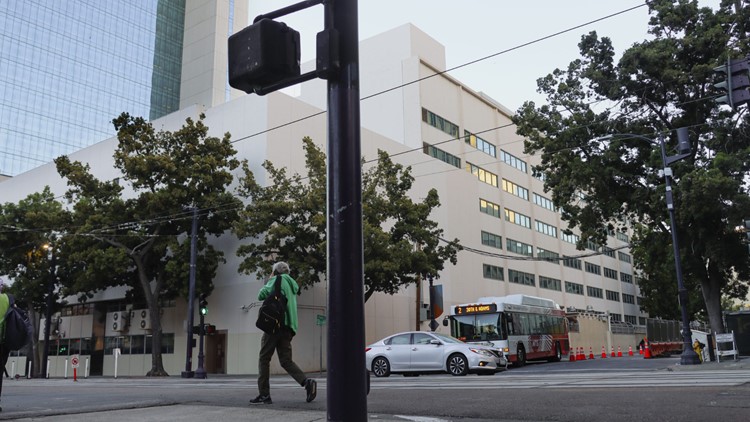SAN DIEGO COUNTY, Calif. — A week before its closure, a controversial federal jail in downtown San Diego was granted permission to stay open for another 90 days, multiple sources confirmed to inewsource.
The sudden reversal surprised attorneys and employees who are now left wondering what will happen when the expiration date approaches again in three months.
Western Region Detention Facility was preparing to shut down on March 31 in response to a 2021 executive order to phase out federal private detention centers as their contracts expire. An international private prison company, The Geo Group Inc., houses pre-trial detainees at the San Diego jail for the U.S. Marshals Service.
This is the second reprieve offered to Western Region since the federal order went into effect. The detention center was first scheduled to close in September when its original contract came up for renewal, but shortly before the deadline, the Marshals Service granted a six-month extension through the end of March.
In the weeks leading up to expected March 31 closure, the GEO Group sent termination letters to staff warning them of their end dates, and the Marshals Service transferred most detainees to other locations.
But during that time, neither GEO Group nor the Marshals Service would confirm with inewsource that the jail would close at the end of the month. The local chapter of the American Civil Liberties Union was also unable to get clear answers, prompting a lawsuit against the Marshals Service that is ongoing.
After the contract was extended again on Friday, the Marshals Service continued to stay silent. Spokespeople did not explain what will happen to the detainees who were already transferred out of the jail or clarify the long-term plans for the facility.
The announcement was considered a victory by the National Federation of Federal Employees, which represents 300 workers at Western Region who could lose their jobs if the jail closes.

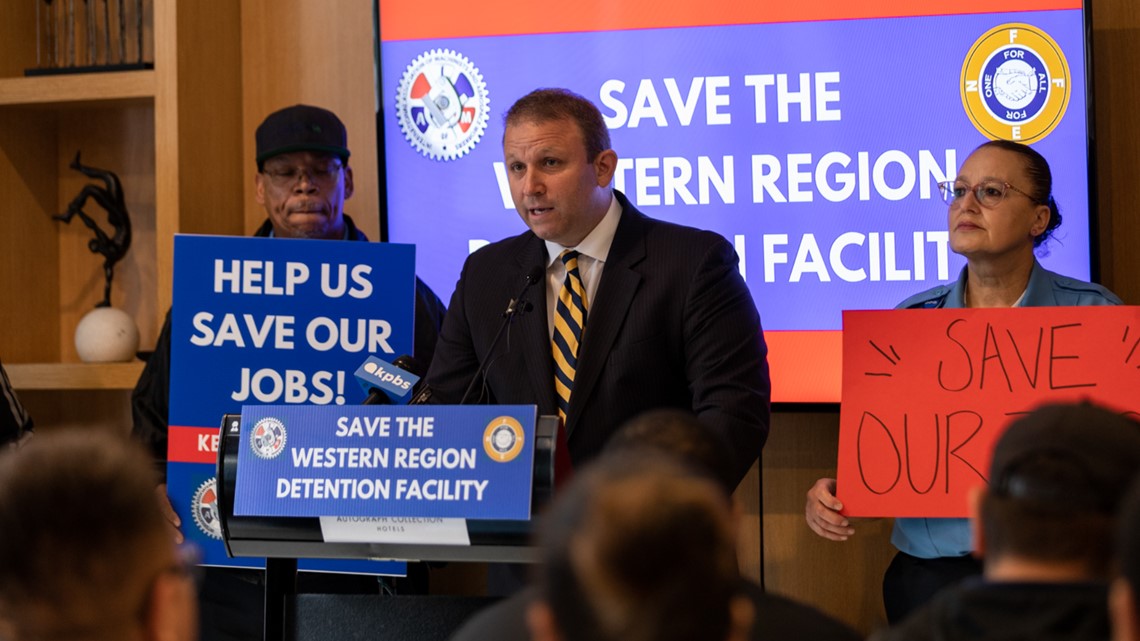
Randy Erwin, the national union president, first told inewsource Friday evening about the contract extension. He said he was “ecstatic” after learning the news, but added that he is still hoping for a more permanent solution.
“I think there is a chance,” Erwin said. “It’s never over until it’s over.”
A debate over beds
The lack of detention space in Southern California is central to the debate over Western Region’s future.
The Marshals Service works with local, state and federal agencies — as well as private companies — to house people in its custody. If the number of contracts it has in the region drops, defendants will be sent farther away from their attorneys and families while they wait for their court cases to process.
Even though the Marshals Service tries to house people within 50 miles of their courthouse, few options remain in San Diego County.
The Marshals hold a limited number of detainees at the Otay Mesa Detention Center, a privately run immigration detention facility, but those defendants might also have to relocate because of the executive order when the jail’s contract expires in 2029.
In the last few weeks, the Marshals Service has transferred Western Region defendants to facilities in El Centro, about 115 miles away from downtown San Diego, and Victorville, about 150 miles away.

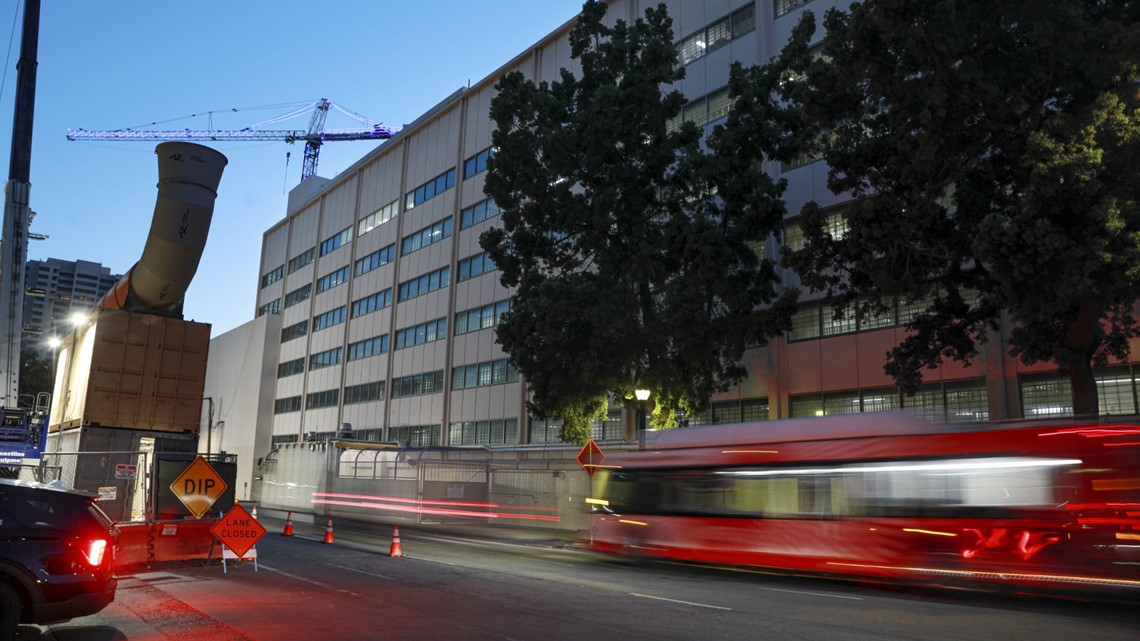
A month after Biden signed the federal order, the Marshals Service wrote an internal memo calling privately run jails “integral” to its mission, and the decision to phase them out “detrimental.”
The Marshals Service houses roughly 8,000 people in 16 private facilities. Another 31 detention centers holding Marshals detainees are run by state or local governments that contract with private companies to manage them.
“There simply is not enough bed space,” the memo says.
Attorneys at the federal public defender’s office, which represents many clients at Western Region, have spent significantly more time traveling since the Marshals Service started transferring defendants to other counties.
Cassandra Lopez, a supervisory attorney at Federal Defenders of San Diego, said the Marshals Service had been working with her office to help prepare for the closure on March. 31. She wasn’t aware of the 90-day extension until inewsource told her Monday morning.
“We’ve been kept in the loop as to the Marshals Service’s plans for how they’re going to house people in light of the fact that there’s going to be one facility that’s no longer available,” Lopez said on Friday, before the extension was announced.
Even with longer travel times, Lopez said she believes her clients are better off in a facility like the one in Victorville, which seems to offer better medical care, programs and living spaces than Western Region.
Public defenders have complained about conditions inside Western Region, and so have workers and detainees. Activists have argued that financial incentives drive prison companies like GEO Group to cut costs and provide poorer services.
Biden’s executive order states that private detention facilities “do not maintain the same levels of safety and security for people in the Federal criminal justice system or for correctional staff.”
inewsource recently reported on the spread of COVID-19 among people incarcerated at Western Region, resulting in at least one death. Another detainee with the virus was forced to clean up a flood of wastewater in his cell after returning from the hospital, and wasn’t given gloves or hand sanitizer, court records state.
GEO Group is also facing three class action lawsuits for its management of the San Diego jail.
Lopez said the public defender's office didn’t object to the executive order, because she and her fellow attorneys believe it is “well founded.”
The office is advocating for judges and prosecutors to use the order as an opportunity to lower bonds and offer pre-trial releases to more clients — most of whom are facing nonviolent charges — rather than forcing them to wait for their court dates in jail cells.
“We think that there’s an overuse of detention in the Southern District of California,” Lopez said.
A domino effect
Since the executive order was announced, local and national coalitions have sent letters asking the federal government to reconsider closing Western Region.
Last year, the San Diego Regional Chamber of Commerce, the San Diego and Imperial Counties Labor Council and the National Association of Blacks In Criminal Justice urged the White House to grant an exception. So did Rep. Scott Peters, whose district includes Western Region.
Dozens of the jail’s employees have sent postcards to Biden explaining how losing their jobs would impact them, some of whom are single parents or supporting ill family members.
“If my employment is terminated, I will lose my house and everything,” one postcard says. “I support my elderly parents. I am the main provider. Please note that if (the) facility closes, a lot of lives will change.”
Erwin, the employees federation president, said the union has tried hard to convince the White House and lawmakers to intervene.


“We’re pulling every connection we have with this administration,” Erwin said. “We’re maxing out.”
Erwin and others hoping to keep Western Region open have argued that the executive order should not apply to federal jails, which house pre-trial defendants, as opposed to federal prisons that hold people who have already been sentenced.
So far, at least one federal jail in Leavenworth, Kansas, has closed due to the presidential order, but the majority remain open.
If Western Region shuts down, Erwin said, he fears more federal jails might follow.
“I do worry about a domino effect that will be very bad for working people,” Erwin said.
Until a few days ago, plans to close the San Diego facility were still underway, and the union was prepared to ramp up its efforts.
In the past two months, GEO Group has sent letters to Western Region employees telling them their last day of work would be March 31. The notices — required under the federal WARN Act — contained details on applying for future GEO Group openings and filing for unemployment benefits.
As staff grew increasingly concerned, union leaders planned a press conference that would take place across the street from the jail two days before the closure date. And corrections staff circulated a long text message encouraging one another to call the offices of local Congresspeople and ask for their support.
Last week, GEO Group spokesperson Christopher Ferreira told inewsource the workers’ termination letters “remain accurate.”
Three days later, the company’s contract was extended.

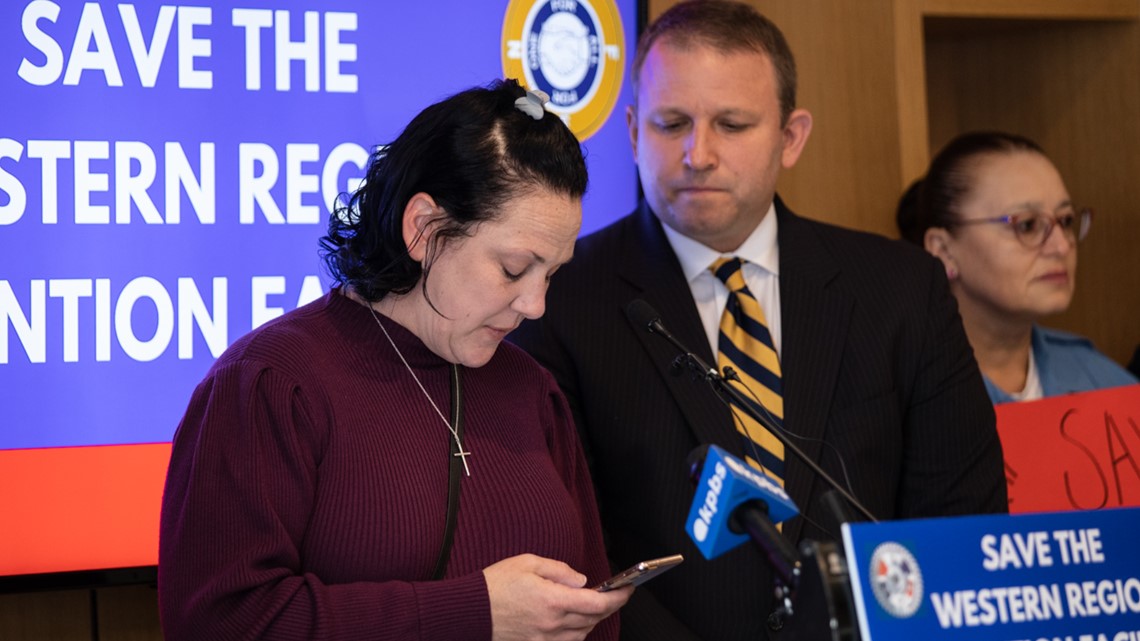
The employees union went through with its press conference on Tuesday to ask the White House for a permanent fix that would save workers’ jobs. Three current Western Region employees spoke about the effect the jail’s closure would have on the San Diego community.
So did Katrina Gutierrez, whose husband used to be detained at Western Region. Since his recent transfer to a facility in Arizona, he has not been able to see his family or his attorney, she said.
“The facility needs to stay open, not only for the employees, but for the families of the inmates,” Gutierrez said. “And my husband made a mistake, but my children did not.”
In the shadows
Geo Group has searched for ways to keep Western Region open indefinitely, but it has yet to solidify a long-term solution.
Early last year, the company approached former San Diego Sheriff Bill Gore to ask if his office could take over the federal jail. Gore told the company his staff didn’t have the capacity.

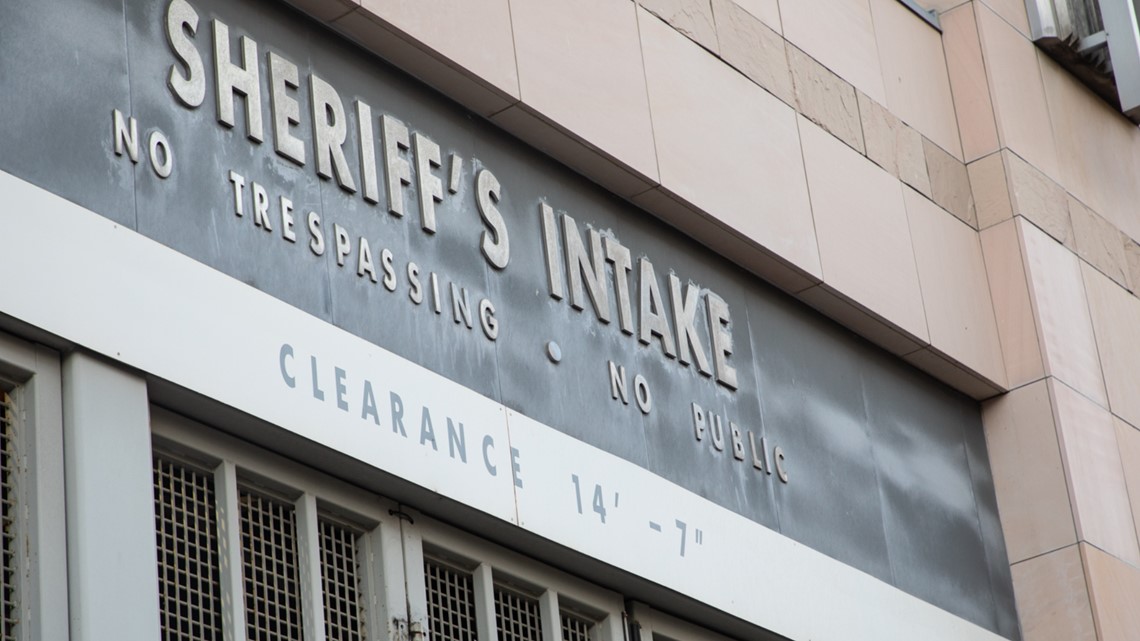
A few months later, GEO Group made a similar request to the city of McFarland, located 250 miles north of San Diego.
Records show McFarland was considering signing a contract with the Marshals Service to operate Western Region, then subcontracting all operations back to GEO Group. The city would receive $500,000 as an administrative fee for serving as an intermediary, and the private company would continue its work at the San Diego jail.
The proposal was lambasted by the ACLU, which accused GEO Group of undermining the president's executive order. In the months that followed, McFarland, the Marshals Service and GEO Group refused to provide information about the negotiations.
In a document handed to media at Tuesday’s press conference, the employees union wrote that GEO Group has approached at least four municipalities about taking over its contract: McFarland, the city of Adelanto, the Riverside County government and the San Bernardino Sheriff’s Department.
According to the handout, the San Bernardino sheriff’s office has declined to participate.
GEO Group has refused to answer any of inewsource’s inquiries pertaining to the contract, referring all questions back to the Marshals Service.
In February, the local chapter of the ACLU sued the Marshals Service after it failed to respond to public records requests about its plans for Western Region, insisting the public had a right to the information.
But the news of the sudden contract extension on Friday came as a surprise to the nonprofit.
“It just reiterates the lack of transparency in the entire U.S. Marshals detention empire,” said Bardis Vakili, senior staff attorney at the ACLU of San Diego and Imperial Counties.
“It doesn’t feel like that’s the way democracy should work, with the incarceration of hundreds of people operating in the shadows,” he added.
The ACLU has also sent public records requests to McFarland that are still being processed.
On Friday, a McFarland city official told inewsource that the conversations about the Western Region contract took place six months ago, and the city has not received more information since then.
“The city was advised this would be an extremely long process and as of today the city has not received an update from GEO,” City Clerk Francisca Alvarado said.
inewsource is a nonprofit, independently funded newsroom that produces impactful investigative and accountability journalism in San Diego County. Learn more at inewsource.org.


